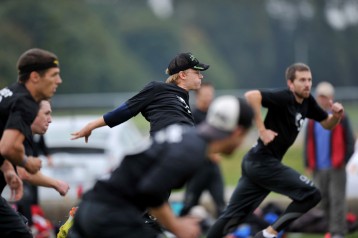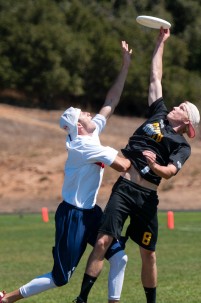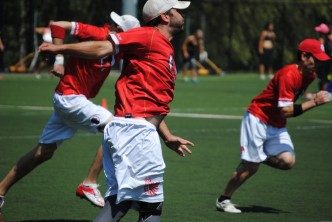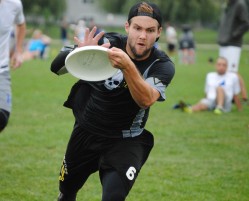This weekend in Corvallis, three of the nation’s top teams will battle in preparation for the Club Championships. Seattle Sockeye and Portland Rhino end this season with lots of momentum after Seattle winning Labor Day and Rhino getting win after gritty win at ECC. Vancouver’s Furious George is coming off a hit or miss season so far, but enters the Northwest’s regionals as the reigning champ (since Revolver has been pushed to another region) and dream crusher after ending both Rhino and Sockeye’s seasons last year. Despite earning three bids for the region after strong pool play, none of these teams are going to take the weekend easy. They will battle tooth-and-nail for that finals win while making sure to fight off a hungry young Voodoo team looking for the steal.
Before we get into looking at each team, let’s all take a deep breath and be grateful for the new bid system. Ahhhhhh! Last year, Revolver, Sockeye, Rhino, and Furious George were all ranked in the top 6 in Skyd’s Power Rankings heading into Northwest Regionals, yet due to a poor showing at the Club Championships the previous year, had only two bids. This year, the Northwest excelled again during the season and rightfully earned three bids for the Club Championships.
Revenge of the Fish
After last year’s stunning loss in the game-to-go, Sockeye failed to qualify for the Club Championships for the first time in over a decade. In a season that showed too few dominating performances and an unfortunate slew of injuries, the Fish ended their season with lots of regret. Yet in 2012, Seattle finally looks again like the dominant Sockeye teams we remember from 2-3 years ago. They have displayed the classic Sockeye strengths of matching hard work with intelligence.
After a respectable ECC performance, Sockeye hit a home run at Labor Day, beating reigning World/National Champs San Francisco Revolver and Boulder’s Johnny Bravo on their way to a finals win. This year’s team has gotten over some early-season injuries and looked very healthy at Washington Sectionals. Despite the loss of veteran players like Ray Illian and Andrew Fleming, the Fish has found great chemistry and picked up great new players. Former Voodoo player Todd Sliva owned the skies at Washington Sectionals and played well against Furious George in the finals.
While last year we saw Sockeye utilize big men like Nord and Erik “The Kraken” Doesburg with their imposing 4-man cup, this year’s team has adjusted to a shorter roster with more clever, unpredictable defenses. On offense they utilize sprightly handler movement setting up big hucks. Furious George’s captain Morgan Hibbert observes, “Their offense is so quick, and relies heavily on timing and quick thinking. When it is working effectively it is a joy to watch and very difficult to stop. But it is fairly high-risk, and if their timing is ever so slightly off they start producing a lot of unforced turnovers.” The offense works best when the downfield defenders give plenty of room for 3-4 squirrelly handlers to weave through with give-and-goes and swings. The downfield cutters will time accordingly for fast cuts deep, or draw defenders in when they see a sudden streak deep by a Sockeye handler. When defenses throw a zone that takes away space for handlers to cut openly and effectively takes away the deep threat, this offense grinds to a halt. Eventually the handlers will usually grow inpatient and try to open the field with risky cross-field blades and hammers. This will be the best bet for teams that can’t match their speed and athleticism.
After winning Labor Day, Sockeye is definitely the favorite coming into Regionals. Yet many in the Northwest think Rhino may be the strongest team. Sockeye will be going into Corvallis with a goal to get in some elite competition and prepare for a shot at finals in Sarasota. Despite last season’s early ending, Sockeye absolutely should be considered as a contender to win the Club Championships and they will be seeking perfection this weekend.
Sarasota in Sight
Just four years ago, Portland’s Rhino had to completely reinvent itself. Current captain Mario O’Brien explains, “In 2008, there were four returners, and we were lucky to have even been invited to big tournaments. In 2009, we won our first 2 games at ECC, then lost 10 straight through Labor Day.” In both of the last two years, Rhino has squandered leads in the game-to-go and lost to Vancouver’s Furious George. As documented in Matt Mastrantuono’s fantastic documentary Chasing Sarasota, Rhino has struggled to rebuild and has felt the pain of many lost opportunities in clutch moments.
Yet this year, Rhino has risen above and shown their true potential. In his second year as coach/captain/dictator-for-life, veteran player Seth Wiggins is building a solid program. At ECC, Rhino was the surprise of the tournament. In their first game against Ironside, Portland came back from 3-8 at half to win on universe point. But the weekend was just starting for Rhino. In their next five games, Rhino would take the game to universe point and win. That’s right. Six games in a row, Rhino was in do-or-die moments and played clutch every time.
In Chasing Sarasota, O’Brien laments Rhino’s inability to win in crunch time. After a disappointing loss to Furious at Solstice, he admits that choking has been the team’s fate time and time again. “We Rhino’d it.” After their incredible performance at ECC, it seems Rhino has finally mastered the art of being clutch. Mario explains, “Of course, we’re happy to get wins, but we honestly don’t think about or focus on being more clutch. We’ve focused on doing more work and getting better as a team and as individuals. When you put in the time with your teammates in the gym, on the track, and with focus in practice, you develop a chip on your shoulder that gives you confidence. This leads to a better chance of success in big moments.” The hard work these guys have been putting in is obvious. Last year’s team saw how much work was necessary if they wanted to excel at elite ultimate. In 2012, Rhino was much more serious, with captains putting more pressure in games and practice. It’s paid off. Rhino has finally returned to elite ultimate.
As we draw nearer to October, it seems that Portland will finally reach their goal of qualifying for the Club Championships. After earning a strength bid with a solid ECC performance and respectable Labor Day, Rhino is on the cusp of reaching Sarasota. Poor Mario has had to watch that regionals loss to Furious probably half a dozen times at the several screenings of Chasing Sarasota this summer. So how does it feel to be so close? “Mostly, we feel strong and prepared. We know our opponents well, and we’re healthier and deeper now than any run we’ve made into regionals in recent memory. We’re also a full year more developed with our O and D sets, and we’ve added great players to our roster.”
Speaking of new players, let’s get this out of the way: yes, Chase Sparking-Beckley and Jeremy Norden are on the roster. If they are healthy, they’ll play. But Mario explains it would be a mistake for teams to get hung up on some big-name pickups. The real threats are players like Riley Meinershagen, Ben Lohre, and Chris Hancock. “Riley averages at least a block per game, which is terribly impressive in our league. Ben Lohre and Chris Hancock are the hardest workers on our team, both have physically transformed themselves, and consistently win their matchup.” And don’t forget Mario himself, one of the best defensive handlers in the game. On offense, Dylan Freechild and Seth Wiggins seem unstoppable with the disc. Look for Seth and the other handlers to shred marks with I/O throws to downfield cutters.
This year’s Rhino is the real deal. Their only losses this season have been to Revolver, Chain, and Ironside. Finally making it to Sarasota won’t be enough for this team. This weekend, they can finally get the regionals monkey off their back and finish ahead of Furious and Sockeye. When asked if the pressure is off Portland after already earning a strength bid, Mario responded, “If our goal was just to get to nationals, yes, you might say there’s less pressure. Our goal is to position ourselves for a run at playing in the important games on Saturday and Sunday in Sarasota. Winning the region will set the table for that run.” Rhino has a good chance to win this region and could go far into the championship bracket at Nationals. It is more than they could ever have hoped for a year ago. Rio reflects, “This season is not just about this year or last year, it’s about the work that’s been put in over the last five, as well as the years to come. We’re proud of the work we’ve put in, and proud to represent Oregon.”
The Big, Bad Monkey
Last year, Furious George peaked early to win the Canadian Championships, crushed at Labor Day, and played incredible on Sunday at Northwest Regionals. Unfortunately, it seems that by the time the Club Championships came around, the team was spent and had a disappointing finish. Furious’s captain Morgan Hibbert agrees. “Because of the circumstances of last season we were attempting a triple peak. CDN Nationals was the first and Regionals was the 2nd. In the month leading up to Regionals our entire focus was on trying to qualify out of the NW region.” Vancouver spent the entire spring preparing for GOAT and the series getting ready for Sockeye, Revolver, and Rhino. On Sunday at regionals, Furious displayed the most clutch performance I have ever witnessed. After losing to Rhino in the semis, they beat up Voodoo and then launched comebacks in back-to-back games against a fired up Sockeye and a well-rested Rhino. Furious players like Kevin Underhill came down with seemingly every 50/50 disc. Yet after winning the bid, they were exhausted come Sarasota. “The process of earning that second bid, and qualifying by besting Sockeye and Rhino was such an extreme high that everything afterwards felt somewhat flat,” explains Hibbert. “By the time we got to Florida we already had two extremely emotional highs (CDN Nats and Regionals) that we were totally spent physically and mentally. Our opponents came out much hungrier than us and it showed in the results.”
This year, Furious faced a similar challenge of attempting the double-peak. They spent the spring preparing for Revolver and Japan and entered Worlds as a legitimate contender. Morgan explains what steps Furious took to avoid burnout. “Worlds was a big focus for us, but it was also fairly early in the calendar. We took a long break off and didn’t start practicing again until August. We knew this would be tricky given the need to perform well at ECC and Labor Day but we also knew the time off was important. We started up in August and treated it like the beginning of the season.” This season, Furious would combat mental burnout by switching up roles for cutters and handlers or sometimes simply not calling lines at tournaments.
Another challenge for this team is the roster discrepancy between Team Canada, the Worlds roster filled with Canadian pickups like John Hassell and Jeff Lindquist, and Furious George, the Vancouver club team participating in the Club Championship Series. “Having this split squad early in the year was really challenging. Our entire focus was on Worlds up till August, and then it felt like we had to reintroduce 10 new players into a tight group that had already been through something so impactful together,” says Hibbert. While it may damage chemistry to not have a stable roster until August, it helps inject some fresh and motivated players into the team. “This might end up being a blessing in disguise as we now have these 10 hungry players pushing everyone else deep into October and avoiding that burnout we had last year post Regionals.”
So where can we expect Furious to finish at this year’s regionals? I am not big enough of a fool to ever try to predict a Furious-Sockeye regional game. These teams know each other incredibly well and are always willing to fight to the death (except sectionals, of course). “We know how they like to play, and they know the same about us. It just comes down to who executes better,” says Morgan. At sectionals, the two things that stood out were how much bigger the Furious team is and how much faster Sockeye played. Sockeye’s shorter roster was still able to dictate on offense with strong, aggressive cuts by cutters like MC Caldwell and newcomer Todd Sliva and lightning fast give-and-goes by the handlers. In the air, Furious players were able to assert themselves with their size and aggressiveness. “For us, the key is to contain their handlers and slow them down. If we can slow down Karlinsky, Holt, Castine, Harkness, Kinley and crew and contain their give go’s and break force throws then they’ll miss their shots to their well timed lane cutters and their offense will stall,” predicts Morgan. If that happens, Furious is well-equipped to stop any impatient hucks that may go up.
Seth Wiggins warns in Chasing Sarasota that Furious is a team that may sandbag it during the year but finally gets their act together once the series starts. And once it does, they can elevate themselves to another gear. Expect this weekend to be when Furious finally wakes up and starts playing to their potential. “We play to win,” says Morgan. “Otherwise there is no point and we might as well retire. We want to go in through the front door as Northwest regional champions. We know we’ve had a mediocre season so far with too many close losses and not enough big victories. Winning Northwest Regionals would be a great launching pad towards the final month of the season.” You have to wonder if Furious feels a bullseye on their back after ending the Sarasota hopes of Sockeye, Rhino, and Voodoo last year. On top of heated rivalries, Canada also had a problem with their reputation after Worlds this year. When I asked Morgan about Furious’s reputation as the “Big, Bad Canadians” he laughed and said, “I love it! I love being the antagonist! Bring it on. It has been like this ever since I joined Furious (and even before that) and I wouldn’t want it to change. As far as having a bullseye on our back that is nothing new.” There should be no doubt that Furious intends to win regionals. That’s just who they are, pure competitors. “Everyone loves trying to beat Furious and it gives me great pleasure to know we are going to get everyone’s best effort and it makes it that much sweeter when we crush their dreams.” Is that quote not Furious in a nutshell?
The Second Other Team in Seattle
The only real chance for an upset this weekend will come from Voodoo, Seattle’s other team. Voodoo played great games at ECC, including putting up 13 points on Truckstop and launching an exciting 4-point comeback against Sub Zero before losing on universe point. They also surprised a lethargic Sockeye in their last game, going up early with a stifling zone and big plays on offense. Yet Voodoo’s own hopes for earning a strength bid were quashed at Chicago Heavyweights. Hoping to show off some strong play against other regions, Voodoo ended up going 3-4 with losses to Inception and Sprawl. A roster of only 16 players and the absence of Coach Ben Wiggins made Heavyweights an exhausting and frustrating tournament. When asked about the season, captain Elliot Trotter admits, “Low point was easily Chicago Heavyweights. We played a lot of teams we felt like we should have beaten but didn’t. We fully expected to be in that final even with a small roster. Chicago, though, helped us to see where we need to improve.”
After a 2011 season that boasted wins over Southpaw and Colombia, Voodoo suffered a large roster turnover, including four players earning spots on Sockeye, to leave only 10 returning players. Yet Trotter is pleased with this year’s team. “Voodoo 2012 is a much better team than Voodoo 2011. Not that we’re necessarily more talented, but this year we’ve come together under a system a lot more and have built a strong team unit.” That system is orchestrated by Coach Wiggins and perfected through intense work outside of practice. Wiggins explains, “Over the past few months, we’ve shored up the rotations and built a game plan that is really based on the outside-of-practice effort that players are putting in. A core group that has been working extremely hard is getting the PT, and we tailored the offensive and defensive strategies to match what they do best.”
This year, returning players like Nevin Root and Henry Schneider continue to impress as they develop in Coach Wiggins’s system. Voodoo has also made several useful roster pickups to add size, speed, and handling. The offense is lead by Michigan alumn Jeff Pape and the veteran former San Diego all-star Adam “Kubiak” Desjardins. These two marched through Sockeye’s zone defense throughout the Sectionals matchup, showing off precise throws and great vision. The reason this new team has been able to progress so well has to do with the hard work of new players and the remarkable coaching of Wiggins. Captain Trotter says, “Ben has the uncanny ability to understand the game and say just the right things in every huddle. He has a ton of experience that is really crucial to a young team like Voodoo.”
Going into regionals, it is difficult to say what their best chance is for stealing a bid. Historically, Furious has pushed around Voodoo easily enough, beating them at Labor Day and eliminating them from the championship bracket at regionals last year. Voodoo has not played Rhino since Flowerbowl, when both teams were with tryout squads. Yet in their games against Sockeye at ECC and Sectionals, Voodoo has performed well. When playing against their fellow Seattleites, Voodoo has come out hungry and caught Sockeye unawares. “Voodoo matches up well against Sockeye,” says Elliot Trotter. “Sockeye has every reason to underestimate Voodoo, and Voodoo uses this to our advantage. We know Sockeye so well that we feel very comfortable playing against them.” At Washington Sectionals, Voodoo broke Sockeye on the first point, going up 4-1 and eventually taking half. The Fish suffered several throwaways in the first half, capitalized on by a chilly Voodoo d-line. Only after Voodoo went up 8-6 did Sockeye get up to speed, taking it to 9-9 and eventually winning 13-11. “Sockeye is a great team that knows how to push on the pedal until the end of the game. This ability is something that Voodoo underestimates ourselves, but come regionals we sure as hell won’t be on cruise control.” While Trotter is optimistic, Voodoo probably won’t be lucky enough to catch Sockeye unmotivated in their likely semifinals matchup.
When asked what Voodoo’s goals are for the weekend, Wiggins says, “Making Nationals would be a huge validation of what we are trying to do here. It would also require knocking out a team that is a good bet to make quarterfinals at Nationals at the least, so it is a tall task.” Elliot explains the mantra for this year’s team has been to end the season with no regrets. “What that means is doing everything we can to have the most fun and be the best team we can be. You’re going to see the best sideline in the nation wearing yellow and black. And of course we’re going to eat souls and play like the dead men of Dunharrow.”
Feature photo of Vancouver’s Oscar Pottinger catching the game-winning goal over Nate Castine to end Sockeye’s season early in 2011 (Photo by Ben Beehner)













Comments Policy: At Skyd, we value all legitimate contributions to the discussion of ultimate. However, please ensure your input is respectful. Hateful, slanderous, or disrespectful comments will be deleted. For grammatical, factual, and typographic errors, instead of leaving a comment, please e-mail our editors directly at editors [at] skydmagazine.com.